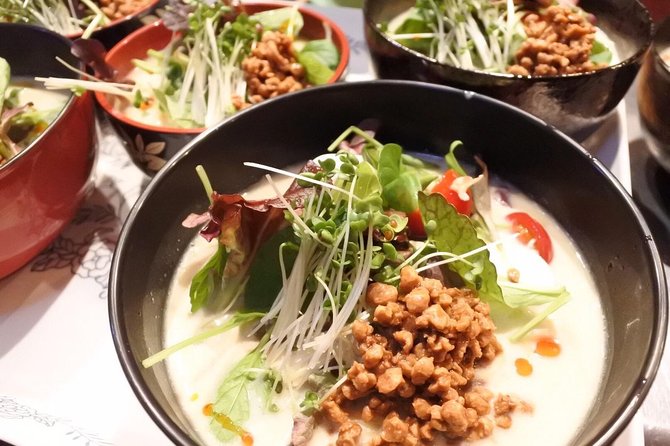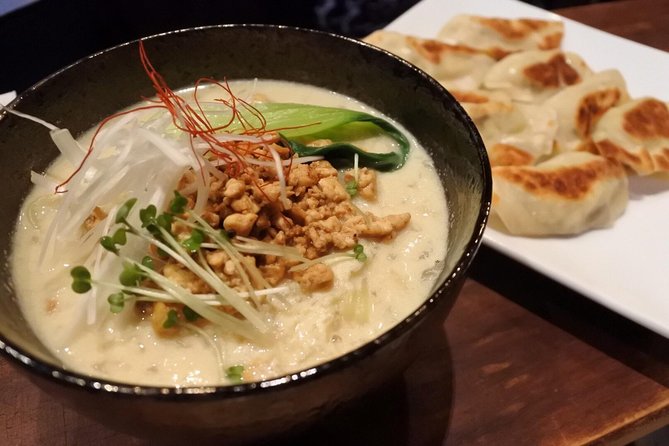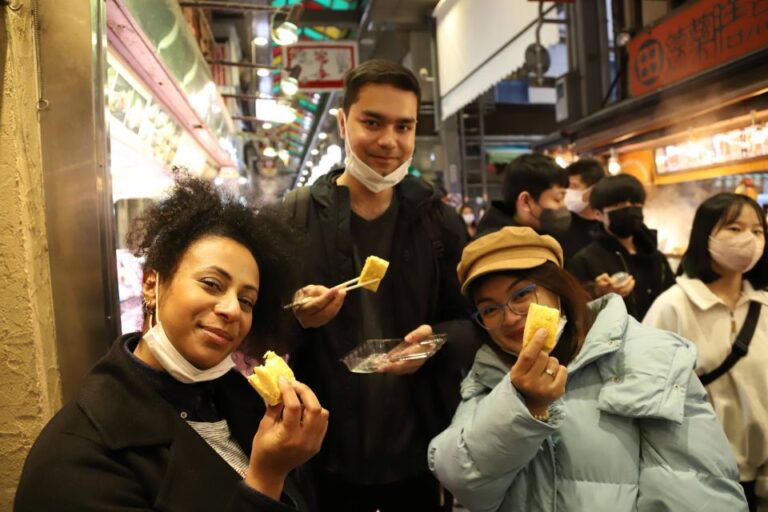According to recent surveys, the number of people following vegetarian, gluten-free, or HALAL diets has been steadily increasing in the past decade.
As a result, there has been a growing demand for alternative options that cater to these dietary preferences, even in traditionally meat-heavy dishes like ramen and gyouza.
In this article, we will explore the fascinating world of Vegetarian Gluten-Free/HALAL Ramen and Gyouza, uncovering the creative techniques and ingredients used to make these dishes accessible to a wider audience.
From exploring plant-based broths to discovering alternative protein sources, this discussion promises to reveal a range of tantalizing options for those seeking a meat-free, gluten-free, or HALAL alternative.
Get ready to embark on an exciting culinary journey where taste, dietary restrictions, and innovation come together seamlessly.
Quick Takeaways

- Vegetarian ramen can be made with a variety of ingredients such as tofu, mushrooms, seaweed, and vegetable broth.
- Gluten-free gyouza options are available using alternative flours like rice flour, tapioca flour, and cornstarch.
- Both vegetarian ramen and gluten-free gyouza provide safe and delicious options for those with dietary restrictions.
- Experimentation with flavors, fillings, and cooking techniques can lead to unique and satisfying vegetarian gluten-free/HALAL ramen and gyouza dishes.
Ramen: A Flavorful Vegetarian Option

Ramen offers a flavorful vegetarian option that satisfies even the most discerning taste buds. With various variations and fusion flavors, vegetarian ramen has become a popular choice for those seeking a delicious meat-free alternative.
There are different types of vegetarian ramen recipes to cater to various dietary preferences and tastes. From miso-based ramen to soy-based broths, there’s a wide range of options to choose from.
In addition, vegetarian ramen has embraced fusion by incorporating international flavors. Ingredients like tofu, mushrooms, seaweed, and vegetables are combined with spices and seasonings from different cuisines to create unique and bold flavors.
Whether you prefer a classic vegetarian ramen or want to explore new and exciting fusion creations, there’s a vegetarian ramen recipe out there to suit every palate.
Gyouza: A Delicious Gluten-Free and HALAL Choice

Gyouza, a delectable gluten-free and HALAL choice, offers a flavorful and satisfying option for those looking for a meat-free alternative. Here are three reasons why gluten-free gyouza alternatives and HALAL ramen variations are worth trying:
- Gluten-Free Goodness: Gyouza made with gluten-free wrappers are perfect for individuals with gluten intolerance or celiac disease. They provide a safe and delicious option for those who want to enjoy this savory dumpling without worrying about gluten.
- HALAL Certified: HALAL gyouza ensures that the ingredients and preparation methods adhere to Islamic dietary laws. This makes it a suitable choice for Muslims who follow a HALAL diet, providing them with an opportunity to indulge in this flavorful dish.
- Variety of Fillings: Gyouza can be filled with a variety of ingredients, such as vegetables, tofu, mushrooms, or even plant-based meat substitutes. This allows for endless flavor combinations and ensures that there’s a gyouza option to satisfy every palate.
With gluten-free gyouza alternatives and HALAL variations, everyone can enjoy the deliciousness of this traditional Japanese dish.
Ingredients: Exploring Vegetarian and Gluten-Free Options

After exploring the benefits of gluten-free gyouza and HALAL variations, it is now time to shift our focus to the ingredients used in vegetarian and gluten-free options for ramen and gyouza. When it comes to vegetarian ramen alternatives, there are a variety of ingredients that can be used to create a flavorful and satisfying dish. Some popular options include tofu, mushrooms, seaweed, and vegetable broth. These ingredients provide a rich and savory taste that can rival traditional meat-based ramen. For gluten-free dumpling variations, alternative flours such as rice flour, tapioca flour, or cornstarch can be used instead of wheat flour. This allows individuals with gluten sensitivities or celiac disease to enjoy delicious dumplings without any adverse reactions. The table below provides a quick overview of the vegetarian and gluten-free options for ramen and gyouza:
| Vegetarian Ramen Alternatives | Gluten-Free Dumpling Variations |
|---|---|
| Tofu | Rice Flour |
| Mushrooms | Tapioca Flour |
| Seaweed | Cornstarch |
Cooking Techniques: Preparing Ramen and Gyouza the Vegetarian Way
To prepare ramen and gyouza the vegetarian way, various cooking techniques can be employed to create flavorful and satisfying dishes. Here are three techniques to consider:
- Creating Vegetarian Ramen Broth: Instead of using traditional meat-based broths, vegetable broths can be used as a base for the ramen. Ingredients like mushrooms, seaweed, and miso paste can be added to enhance the flavor and create a rich, savory broth.
- Using Alternative Fillings for Gyouza: Vegetarian options for gyouza fillings can include ingredients like tofu, cabbage, carrots, and shiitake mushrooms. These fillings can be seasoned with soy sauce, ginger, garlic, and other spices to create a delicious and satisfying taste.
- Steaming and Pan-Frying Techniques: Gyouza can be prepared by steaming and then pan-frying them to achieve a crispy texture. Steaming helps to cook the filling while pan-frying adds a crispy and golden crust to the gyouza.
Flavor Enhancements: Adding Depth to Vegetarian Ramen
Adding depth to vegetarian ramen can be achieved by incorporating bold and flavorful ingredients and seasonings.
One way to enhance the flavor of vegetarian ramen is by using a variety of umami-rich ingredients. Umami, often referred to as the fifth taste, adds a savory and satisfying element to dishes.
Some umami-rich ingredients that can be added to vegetarian ramen include mushrooms, seaweed, miso paste, soy sauce, and fermented products like kimchi or sauerkraut. These ingredients can provide a depth of flavor and complexity to the broth, making it more satisfying and robust.
Plus, experimenting with different flavor variations, such as adding spices like ginger, garlic, and chili, or incorporating tangy ingredients like vinegar or citrus, can further enhance the taste of vegetarian ramen.
Serving Suggestions: Pairing Vegetarian Ramen and Gyouza
Pair vegetarian ramen with gyouza for a delicious and satisfying meal. Here are three serving suggestions to enhance your dining experience:
- Vegan Alternatives: For those following a vegan diet, consider using vegan alternatives for the gyouza filling, such as tofu or mushrooms. These plant-based options can provide a similar texture and flavor to traditional gyouza, while still maintaining the vegetarian theme.
- Cultural Variations: Explore different cultural variations by pairing your vegetarian ramen with gyouza from different cuisines. For example, try Korean mandu or Chinese jiaozi alongside your ramen for a fusion of flavors. This allows you to experiment and discover new taste combinations.
- Texture and Contrast: The combination of the rich and flavorful ramen broth with the crispy and savory gyouza creates a delightful contrast in both taste and texture. The soft noodles and vegetables in the ramen complement the crunchy exterior of the gyouza, making each bite a harmonious blend of textures.
Tips and Tricks: Mastering Vegetarian Gluten-Free/HALAL Ramen and Gyouza
For those looking to expand their culinary skills, mastering the art of vegetarian gluten-free/HALAL ramen and gyouza is a valuable addition to your repertoire. Whether you have dietary restrictions or simply want to explore new flavors, there are various tips and tricks that can help you create delicious and satisfying dishes.
In the table below, you will find some suggestions for vegetarian ramen substitutions and halal gyouza variations:
| Vegetarian Ramen Substitutions | Halal Gyouza Variations |
|---|---|
| Replace pork broth with vegetable or mushroom broth | Use halal-certified ground chicken or beef as filling |
| Substitute wheat noodles with rice noodles or gluten-free noodles | Incorporate diverse spices and seasonings for flavor |
| Add a variety of vegetables like bok choy, mushrooms, and corn | Experiment with different dumpling wrappers like rice paper or gluten-free dough |
| Use tofu or tempeh as protein options | Incorporate traditional halal ingredients like cumin, coriander, and cardamom |
| Garnish with fresh herbs like cilantro, green onions, or basil | Make a flavorful dipping sauce using halal soy sauce and vinegar |
These tips and tricks will allow you to customize your vegetarian gluten-free/HALAL ramen and gyouza to suit your dietary preferences and ensure a delicious meal every time.
Frequently Asked Questions
Is the Cooking Class Suitable for Individuals With Dietary Restrictions or Allergies?
The cooking class curriculum is suitable for individuals with dietary restrictions or allergies. The ingredients used in the class can accommodate vegetarian, gluten-free, and HALAL diets.
Can I Request a Different Date or Time for the Cooking Class?
Yes, you can request a different date or time for the cooking class. The cooking school is accommodating and will do their best to accommodate your schedule. Please inform them of your preferred date and time when booking.
What Is the Maximum Number of Participants in the Cooking Class?
The maximum capacity for the cooking class is 4 participants. There are no specific age requirements mentioned.
Are the Cooking Techniques Taught Suitable for Beginners?
Yes, the cooking techniques taught in the class are suitable for beginners. They are designed to be beginner-friendly and not overly difficult, ensuring that participants can easily learn and follow along.
Is the Cooking Class Taught by a Professional Chef?
Yes, the cooking class is taught by a professional chef. The class is hands-on, allowing participants to learn and practice cooking techniques. The vegetarian ramen and gyoza use fresh ingredients like vegetables, gluten-free noodles, and halal-certified meat alternatives.
The Sum Up
To sum it up, Vegetarian Gluten-Free/HALAL Ramen and Gyouza offer a delicious and inclusive option for those with dietary restrictions.
By using innovative techniques and ingredients, these dishes provide a flavorful alternative to traditional meat and gluten-containing ramen.
Whether you follow a vegetarian, gluten-free, or HALAL diet, there are now plenty of options available to enjoy a satisfying bowl of ramen and gyouza.
With the right ingredients and cooking techniques, you can create a delectable and wholesome meal that caters to your dietary preferences.





